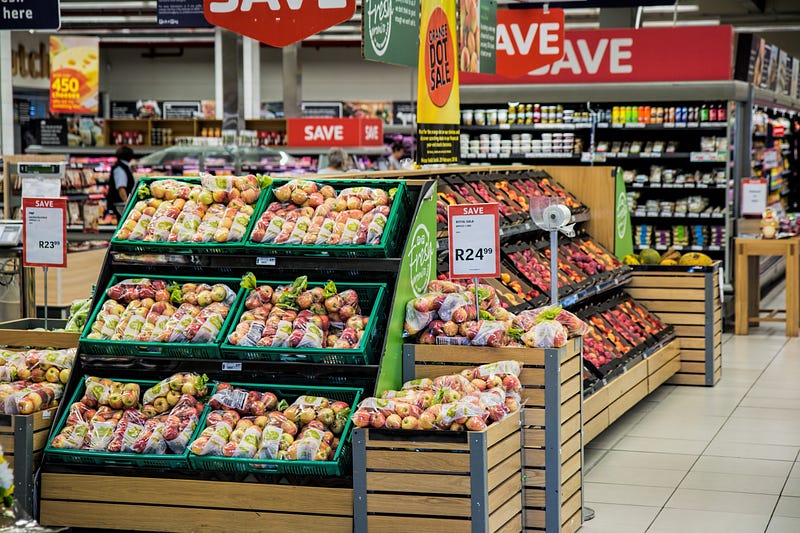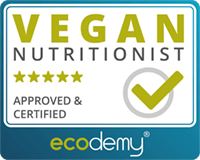Make the most out of every grocery shopping trip
Shopping for groceries can be a daunting task, especially if you’re trying to adopt a plant-based diet. With so many products on the shelves and so much conflicting information out there, it’s hard to know what or how much to buy. I’ve compiled a list of some simple and practical advice on how to shop for plant-based groceries, from reading ingredient labels to finding alternatives to dairy and meat products. It definitely helped me, and it will hopefully help you, too! Whether you’re just starting out or a long-time vegan, you’ll find helpful guidance here.

Visit activeplantbased for professional help and plant-based nutrition training.
Plant-based Grocery Shopping Tips
Stick to the perimeter of the store
This is where most of the fresh produce, grains, and legumes are found.
There, you will find a wide selection of seasonal fruits and vegetables, carefully sourced hopefully from local farmers and suppliers. Grains like wheat and oats come in a variety of forms for your convenience. Legumes such as beans, peas, and lentils are packed with proteins and vitamins that are essential for any healthy diet. With so many natural and fresh options available, it’s easy to create a nutritious meal without needing to venture too far from the store’s perimeter.
This specific placement helps to create an inviting atmosphere that encourages people to traverse the store as they pick up each item. Secondly, having such items located near the entrance and exit creates convenience for shoppers. Finally, studies have shown that placing fresh produce at the perimeter of the store creates a psychological influence, as shoppers are more likely to purchase healthy items when they are more visibly accessible.
Take advantage of seasonal fruits and vegetables for maximum flavour and nutrition.
Eating seasonally helps to reduce your environmental impact by avoiding imported produce and also ensures you get the freshest and tastiest foods available.
You’ll find plenty of options in the produce section, from vibrant berries and leafy greens to root vegetables and tropical fruits. Incorporating these into your daily diet is a great way to ensure you get all the essential vitamins and minerals. Eating seasonally also allows you to experiment with different recipes that use locally sourced ingredients while adding a unique twist to your vegan dishes that matches your taste preferences.
Read labels to make sure no animal products have been added to a product.
Even if a product seems vegan, it might actually not be. You’d be surprised if you looked into how many animal-derived ingredients are actually being used both in edible and inedible products.
The first thing you should do is look for the vegan logo. If you see one, you are good to go. If you don’t, on the other hand, still scan the ingredients list because the product itself might still be vegan.
Here is a list of non-vegan ingredients to be on the lookout for;
- whey
- gelatin
- glycerol
- lecithin
Some processed foods may contain animal-derived additives, such as colouring agents and preservatives, under the names.
- carmine
- red dye №3
- shellac
- tallow
- some artificial preservatives, such as butylated hydroxyanisole (BHA) and butylated hydroxytoluene (BHT), may contain animal products as well.
Choose whole grains over processed foods.
Choose whole grains over processed foods whenever possible. Whole grains are rich in dietary fibre, vitamins and minerals and have a low glycemic index, which helps to control blood sugar levels. Processed foods, on the other hand, are high in unhealthy ingredients such as preservatives, fat, and sugar and have little nutritional value.
We all like to treat ourselves; however, eating too many processed foods can lead to weight gain, so it’s best to focus on incorporating more whole grains into your diet.
Eating whole grains also helps to regulate digestion and can aid in weight control due to their lower glycemic index and higher fibre content. Such food is also more likely to keep you full for longer.
Look for plant-based alternatives to dairy and meat products like tofu, tempeh, seitan, and veggie burgers.
Being vegan doesn’t mean you have to miss out on the joy of eating burgers or meat-resembling products altogether.
There are plenty of delicious, healthy, and sustainable options available that replicate the same flavours and textures of their animal-based counterparts. Tofu and tempeh are great sources of plant-based proteins that can be used as a substitute for meat or eggs. Click here for my favourite 10 ways you can cook tofu.
Seitan, derived from wheat gluten, is another excellent vegan source of protein that can be used to make veggie burgers, sandwiches, and other dishes. Veggie burgers are also widely available in supermarkets and are a perfect choice for those looking for an easy way to replace traditional hamburgers. You can also try making your own burger patties from scratch from beans or veggies. The recipes available online are endless.
Bulk buy to save money.
Speaking from experience, buying grains in bulk is an excellent way to save money and make the most of your food budget. When you purchase larger quantities of items such as rice, oats, quinoa, or other grains, you can often get a better deal than buying in smaller quantities. You also have the option of buying organic grains for added health benefits and cost savings.
And if you think about it, having a ready supply of grains on hand means it’s easier to whip up a healthy meal quickly. Bulk buying grains can be a simple and affordable solution for creating nutritious meals at home.
Try frozen or canned fruits and vegetables when fresh produce isn’t available.
Frozen fruit does not necessarily mean unhealthy since it is able to preserve most of its vitamins and minerals if just frozen and not further processed. This is a great way to make sure you are still getting the vitamins and minerals your body needs and keeping your diet balanced. Plus, it’s easy to store and keep ready for a quick meal or snack.
On the other hand, canned fruit may contain sugar, depending on the type of fruit and the processing methods used to package it. For example, canned fruit that has been packed in syrup or juice (which may not be vegan themselves) will contain more sugar than those packed in water or their own natural juices. However, the sugar content in canned fruit can still be much lower than in many other processed snacks or desserts, so it can still be a healthy choice if consumed in moderation.
So don’t be scared to reach for the frozen or canned section of your grocery store for a healthy and convenient option when fresh produce isn’t available.
Did you find that information helpful?
Thank you for reading and supporting our love of writing.
─ the activeplantbased pub 🐇

